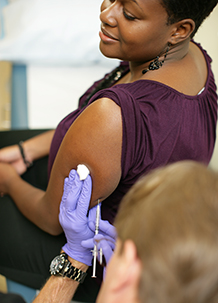
Health Disparity Interventions
Public health theory and practice suggests that risky health behaviors can be altered through interventions that organize and educate communities, screen for risk factors and change environments.
The Oak Ridge Institute for Science and Education (ORISE) helps communities increase the quality of life and reduce health disparities by developing interventions that address the complex causes and numerous barriers related to gaps in health status. Groups most commonly affected by health disparities include:
- Racial and ethnic minorities
- Women, children and the elderly
- Residents of rural areas
- Individuals with disabilities
ORISE specifically works with churches and other faith-based organizations to reduce or eliminate trends in minority health disparities. We also develop culturally-competent outreach programs to address those health issues that disproportionately impact minorities and underserved populations.
These efforts ensure that historically under-served populations receive health information addressing issues that disproportionately affect them, such as HIV/AIDS, cardiovascular disease, diabetes, immunization, cancer and infant mortality. Equally important is improving access to critical health resources in the case of a public health threat such as H1N1.
